
Wine Culture and Information since 2002 - Volume 22
 Wine Culture and Information since 2002 - Volume 22 |
|
Contrasts of Pecorino and GrilloEmerging glory of Marches and Abruzzo, Pecorino is a variety having huge potentials and still to be understood, is getting compared to Grillo, an elegant giant from Sicily |
|
Pecorino and Grillo are two interesting white berried varieties playing very important roles in wine making of Marches, Abruzzo, as for the former, and in Sicily for the latter. In recent times we are seeing more and more elegant and excellent white wines, from their respective regions, produced with these two varieties. Grillo certainly is the grape catching the interest from Sicilian producers since a long time, in particular for the production of the noble Marsala wine. Pecorino - despite its long history - is a variety having huge wine making potentials and only in recent times it is being successful, thanks to the renewed interest from producers who are focusing on this variety. Grillo, of course, is not the expression of Marsala only: despite this is the wine which made this variety famous for a long time, today there are many producers who are using it for their table wines. Both grapes have widely proven to make wines of remarkable elegance, however it is evident this grape has still potentials to be further discovered and waiting to be better understood and investigated. On this regard, producers of Pecorino in Marches and Abruzzo, as well as those of Grillo in Sicily, seem to be quite enterprising and have been successful in obtaining remarkable results. Wines produced with both grapes seem to have a successful future ahead, in particular Pecorino, a variety that seems to have huge unexpressed potentials. From an experimental point of view, even Grillo - as for table white wines - proves to have unexpressed potentials and a long road ahead to walk. Both varieties have been vinified in wood containers - both for fermenting and aging - and produced interesting results. The use of inert containers however seems to be more appropriate for these varieties as this makes wines of a better finesse.
|
|
The singular name of this interesting white grape has nothing in common with the very tasty pecorino cheese produced with sheep's milk. There are many hypothesis about the name of this grape and the one considered to be more reliable has however a strong connection with sheep. It in fact seems the name pecorino originated from a particular predilection sheep had for the sweet taste of this ripe grape as to be called “sheep grape” or “sheep's grape”. Originating from the Tronto river valley - therefore in the territory of Piceno and Northern Abruzzo - areas historically known for the activities of sheep rearing and transhumance. It is believed, during this seasonal movement of flocks, sheep found vines of Pecorino grape along the way and they seemed to particularly like the sweet clusters. This hypothesis, whether it is real or imaginative, does not however affect the potentials and the quality of wines produced with Pecorino grape. It is believed Pecorino grape is an ancient variety and many agree on the fact its original land is the territory of the Tronto river valley, therefore in the Marches region. Its presence is also found in Abruzzo and it reaches the areas of Sibillini mountains as well as the area of Arquata, in province of Ascoli Piceno. This variety is also found, although marginally, in Tuscany, Umbria and Liguria. The first written documents about Pecorino are dated back to the beginning of 1800s, however they did not mention its wines. The revaluation of Pecorino grape has been possible mainly thanks to Guido Cocci Grifoni who worked on the understanding of viticultural and enological potentials of this grape, by reintroducing it in the territories of Offida and Ripatransone, in province of Ascoli Piceno. Thanks to the huge efforts and commitment of Guido Cocci Grifoni, today Offida is one of the main areas where Pecorino has proven to make wines with extraordinary potentials, by obtaining, among the other things, the DOCG rank. (Denominazione d'Origine Controllata e Garantita, Denomination of Controlled and Guaranteed Origin).
|
||||
|
Indisputable king of the best Marsala wines, in particular the Vergine style, Grillo has been successful in proving its wine making value also in the production of table wines. The connection with Marsala is however strong as, historically speaking, Grillo has been almost exclusively used for the production of the famous wine from the ancient city of Lilibeo. The origin of Grillo has been debated for a long time and with not so clear conclusions, also believing - among the many hypotheses - its original land was Apulia, although no one could prove how the grape arrived to Sicily. Grillo is mainly found in the Western area of Sicily and it is here the presence of this grape is known since the end of 1800s, and it is still strongly associated to this part of the island. Thanks to its characteristic quality of making quite alcoholic wines and, in particular, suited for oxidation, it quickly became the main grape variety for Marsala wine. A recent research has been successful, at last, to understand the origins of Grillo and to even determine its place of origin and genesis. According to this research, well supported by documents and reliable facts, Grillo was created in 1874, in Favara - in province of Agrigento - by crossing Inzolia and Muscat of Alexandria, locally known as Zibibbo. The author of this new variety has been Baron Antonino Mendola - an agronomist with a particular interest for vine and viticulture - fruit of hundreds attempts which led to the creation of Grillo. Because of its characteristics, Barone Mendola recommended Grillo as an aromatic variety to be used for the making of Marsala, a grape that really determined the quality of this wine. Today Grillo is clearly a variety in which wine making of Sicily is strongly focusing on, not just for the production of the historical Marsala, but also for great white table wines with huge expressive potentials.
|
|
In order to better evaluate the sensorial profile of the wines while limiting as much as possible the unavoidable wine making interference, we will choose bottles produced with the two grapes alone. This means, moreover, we will choose wines produced in inert containers - steel or cement tanks - while avoiding those fermented or aged in cask. As for Pecorino, our choice will be made for a bottle belonging to the denomination of Offida, the only one recognized as DOCG. (Denominazione d'Origine Controllata e Garantita, Denomination of Controlled and Guaranteed Origin) As for Grillo, this variety is used in many Denominazione d'Origine Controllata of Sicily. In both cases we will make sure the wines to be produced with 100% of the respective grapes, as production disciplinaries provide for the use of small percentages of other grapes. Both wines, belonging to the latest vintage, will be served at a temperature of 10 °C (50 °F) in tasting glasses.
Our tasting by contrast starts from the evaluation of appearance in both wines. In this first phase of the tasting we will not notice substantial differences, as our grapes - Pecorino and Grillo - tend to make wines with the same hues. Both varieties, in fact, make wines having a straw yellow color - more or less intense - with nuances of the same color as well as greenish yellow hues. Let's evaluate the aspect of Offida Pecorino and pour it in its glass. Let's tilt the glass on a white surface and this will let us see a brilliant and intense straw yellow color. Nuances in this wine, observed towards the opening of the glass, reveal an intense greenish yellow color with straw yellow hints. Let's now pass to the observation of Grillo. The color of this wine - observed at the base of the glass - shows an evident straw yellow hue not so different from Offida Pecorino. Nuances in Grillo are pretty similar to those of the wine from Marches, clearly showing a straw yellow color with greenish hints. The differences will become evident with the analysis of the olfactory profile of the two wines. Pecorino and Grillo make wines expressing to the nose fragrant sensations of flowers and fruits, however of different nature, to which are added distant aromas making the two wines very distant one from each other. Pecorino expresses an olfactory profile mainly developing aromas of apple, pear and plum as well as flower sensations recalling hawthorn and broom, frequently enriched by anise, hazelnut, jasmine and tropical fruit. Wines produced with Grillo too are characterized by aromas recalling fruits such as apple, plum and pear, however here we find evident sensations of citrus fruits, almond and chamomile to which can follow tropical fruits and peach. Both varieties have proven to give valuable results even with the vinification in cask, a procedure enriching wines with more complex sensations and can result pretty harmonious with the characteristics of both grapes. Let's start the evaluation of the olfactory profiles of the wines of our tasting by contrasts from Offida Pecorino. Let's hold the glass in vertical position and, without swirling, proceed with the first smell allowing us to perceive opening aromas. From the glass are perceived intense and clean aromas of apple, pear and plum to which follow the pleasing fragrance of hawthorn. After having swirled the glass, let's proceed with the second smell which will reveal the typical anise aroma as well as jasmine, citrus fruits and hazelnut. Sometimes can be perceived aromas of tropical fruits, in particular pineapple. Let's now pass to the evaluation of Grillo's aromas. The opening of this wine offers to the nose aromas of apple, pear and hawthorn as well as the typical hint of almond. After having swirled the glass, the second smell completes the profile of Grillo with peach, citrus fruits, chamomile, orange blossom and broom. Also in this variety can be perceived aromas of tropical fruits, such as pineapple. Let's now pass to the gustatory evaluation of Pecorino and Grillo, by starting from the white wine from Offida. The attack reveals the strong character of Pecorino, with an evident crispness mitigated by the burning effect of alcohol, giving a good balance. Besides these sensations we can perceive a good roundness, however it is the structure to be mainly noticed. In the mouth are perceived flavors of apple, pear and plum as well as a pleasing hint of anise. Let's now pass to the tasting of Grillo. The attack of this wine is characterized by a good crispness, promptly balanced by alcohol and a pleasing roundness. In the mouth are perceived the flavors of apple, pear and the characteristic hint of almond, offering a good correspondence to the nose. The structure of wines produced with Grillo grape is evidently good, a characteristic contributing to the definition of this wine's character. After having evaluated and compared appearance, aromas and taste of Pecorino and Grillo, we are going to evaluate the final sensations the two wines leave in the mouth after having swallowed them. It is in this phase, in fact, one of the most important factors determining the quality of wine is being evaluated: taste-olfactory persistence. The finish of Offida Pecorino has a good persistence and leaves in the mouth a pleasing sensation of crispness supported by its structure, as well as flavors of apple, pear and plum to which sometimes follow anise. The finish of Grillo is characterized by a pleasing crispness and roundness, in which can be well perceived the burning effect of alcohol. In the mouth can be perceived flavors of apple and plum to which follow almond and citrus fruits. Two beautiful representatives of Italian viticulture, Pecorino and Grillo make interesting wines with huge potentials, grapes with which Marches, Abruzzo and Sicilia can trust for their wine making future.
|
||||||||
Wines of the Month |
|
|
|
Score legend Prices are to be considered as indicative. Prices may vary according to the country or the shop where wines are bought |
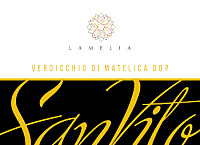
|
|
Verdicchio di Matelica San Vito 2015 |
|
| Lamelia (Marches, Italy) | |
 Verdicchio Verdicchio | |
| Price: € 9.00 | Score: |
 Brilliant greenish yellow and nuances of greenish yellow, very
transparent. Brilliant greenish yellow and nuances of greenish yellow, very
transparent.
 Intense, clean and pleasing, starts with hints of apple, peach and
broom followed by aromas of plum, pear and hawthorn. Intense, clean and pleasing, starts with hints of apple, peach and
broom followed by aromas of plum, pear and hawthorn.
 Crisp attack and however balanced by alcohol, good body, intense
flavors. Crisp attack and however balanced by alcohol, good body, intense
flavors.
 Persistent finish with flavors of apple, peach and plum. Persistent finish with flavors of apple, peach and plum. 8 months in steel tanks, 2 months in bottle. 8 months in steel tanks, 2 months in bottle. |
|
 Fried fish, Risotto with fish and crustaceans, Dairy products, Sauteed fish Fried fish, Risotto with fish and crustaceans, Dairy products, Sauteed fish |
|
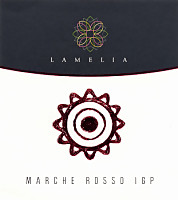
|
|
Marche Rosso 2014 |
|
| Lamelia (Marches, Italy) | |
 Merlot, Syrah Merlot, Syrah | |
| Price: € 8.00 | Score: |
 Brilliant ruby red and nuances of garnet red, little transparency. Brilliant ruby red and nuances of garnet red, little transparency. Intense, clean, pleasing and refined, starts with hints of black
currant, black cherry and plum followed by aromas of violet, blackberry,
blueberry and vanilla. Intense, clean, pleasing and refined, starts with hints of black
currant, black cherry and plum followed by aromas of violet, blackberry,
blueberry and vanilla.
 Properly tannic attack and however balanced by alcohol, good body,
intense flavors, pleasing roundness. Properly tannic attack and however balanced by alcohol, good body,
intense flavors, pleasing roundness.
 Persistent finish with flavors of black currant, black cherry and plum. Persistent finish with flavors of black currant, black cherry and plum. Aged in barrique. Aged in barrique. |
|
 Stuffed pasta, Broiled meat and barbecue, Roasted meat, Stewed meat, Cheese Stuffed pasta, Broiled meat and barbecue, Roasted meat, Stewed meat, Cheese |
|
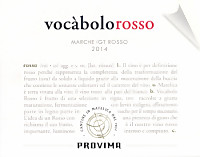
|
|
Vocabolo Rosso 2014 |
|
| Provima - Produttori Vitivinicoli Matelica (Marches, Italy) | |
 Merlot (40%), Petit Verdot (40%), Sangiovese (20%) Merlot (40%), Petit Verdot (40%), Sangiovese (20%) | |
| Price: € 9.00 | Score: |
 Intense ruby red and nuances of ruby red, little transparency. Intense ruby red and nuances of ruby red, little transparency. Intense, clean, pleasing and refined, starts with hints of black
cherry, black currant and plum followed by aromas of violet, blueberry,
raspberry, blackberry and vanilla. Intense, clean, pleasing and refined, starts with hints of black
cherry, black currant and plum followed by aromas of violet, blueberry,
raspberry, blackberry and vanilla.
 Properly tannic attack and however balanced by alcohol, good body,
intense flavors, agreeable. Properly tannic attack and however balanced by alcohol, good body,
intense flavors, agreeable.
 Persistent finish with flavors of black cherry, black currant and plum. Persistent finish with flavors of black cherry, black currant and plum. Merlot and Petit Verdot ages in barrique for 12 months, Sangiovese aged
in steel tanks. Merlot and Petit Verdot ages in barrique for 12 months, Sangiovese aged
in steel tanks.
|
|
 Stuffed pasta with mushrooms, Broiled meat and barbecue, Roasted meat, Stewed meat with mushrooms Stuffed pasta with mushrooms, Broiled meat and barbecue, Roasted meat, Stewed meat with mushrooms |
|
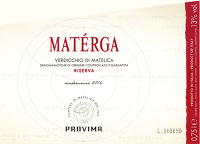
|
|
Verdicchio di Matelica Riserva Materga 2014 |
|
| Provima - Produttori Vitivinicoli Matelica (Marches, Italy) | |
 Verdicchio Verdicchio | |
| Price: € 11.50 | Score: |
 Intense straw yellow and nuances of straw yellow, very transparent. Intense straw yellow and nuances of straw yellow, very transparent. Intense, clean, pleasing and refined, starts with hints of apple, plum
and peach followed by aromas of pear, almond, hawthorn, bergamot, broom,
vanilla and mineral. Intense, clean, pleasing and refined, starts with hints of apple, plum
and peach followed by aromas of pear, almond, hawthorn, bergamot, broom,
vanilla and mineral.
 Crisp attack and however balanced by alcohol, good body, intense
flavors, pleasing roundness. Crisp attack and however balanced by alcohol, good body, intense
flavors, pleasing roundness.
 Persistent finish with flavors of apple, plum and almond. Persistent finish with flavors of apple, plum and almond. A part of this wine ferments and ages in barrique, the remaining part
in cement tanks. A part of this wine ferments and ages in barrique, the remaining part
in cement tanks.
|
|
 Stuffed pasta, Roasted white meat, Roasted fish, Mushroom soups, Stewed fish Stuffed pasta, Roasted white meat, Roasted fish, Mushroom soups, Stewed fish |
|
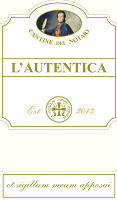
|
|
L'Autentica 2013 |
|
| Cantine del Notaio (Basilicata, Italy) | |
 Moscato Bianco (70%), Malvasia Bianca (30%) Moscato Bianco (70%), Malvasia Bianca (30%) | |
| Price: € 29.00 - 500ml | Score: |
 Brilliant amber yellow and nuances of amber yellow, transparent. Brilliant amber yellow and nuances of amber yellow, transparent. Intense, clean, pleasing, refined and elegant, starts with hints of
raisin, dried fig and dried apricot followed by aromas of candied fruits,
quince jam, peach jam, lychee, honey, date, almond, vanilla, citrus fruit
peel, lavender and nail polish. Intense, clean, pleasing, refined and elegant, starts with hints of
raisin, dried fig and dried apricot followed by aromas of candied fruits,
quince jam, peach jam, lychee, honey, date, almond, vanilla, citrus fruit
peel, lavender and nail polish.
 Sweet and round attack, however balanced by alcohol, good body, intense
flavors, pleasing crispness. Sweet and round attack, however balanced by alcohol, good body, intense
flavors, pleasing crispness.
 Very persistent finish with long flavors of raisin, dried fig and dried
apricot. Very persistent finish with long flavors of raisin, dried fig and dried
apricot.
 12 months in barrique, 12 months in bottle. 12 months in barrique, 12 months in bottle. |
|
 Hard and piquant cheese, Fruit tarts, Confectionery Hard and piquant cheese, Fruit tarts, Confectionery |
|
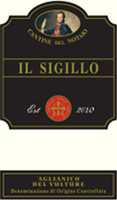
|
|
Aglianico del Vulture Il Sigillo 2010 |
|
| Cantine del Notaio (Basilicata, Italy) | |
 Aglianico Aglianico | |
| Price: € 38.00 | Score: |
 Intense ruby red and nuances of garnet red, little transparency. Intense ruby red and nuances of garnet red, little transparency. Intense, clean, pleasing, refined and elegant, starts with hints of
blackberry, black cherry and plum followed by aromas of dried violet,
blueberry, iris, vanilla, chocolate, tobacco, leather, licorice, clove,
mace and menthol. Intense, clean, pleasing, refined and elegant, starts with hints of
blackberry, black cherry and plum followed by aromas of dried violet,
blueberry, iris, vanilla, chocolate, tobacco, leather, licorice, clove,
mace and menthol.
 Tannic attack and however balanced by alcohol, full body, intense
flavors, pleasing roundness. Tannic attack and however balanced by alcohol, full body, intense
flavors, pleasing roundness.
 Very persistent finish with long flavors of plum, blackberry and black
cherry. Very persistent finish with long flavors of plum, blackberry and black
cherry.
 24 months in cask, 24 months in bottle. 24 months in cask, 24 months in bottle. |
|
 Game, Roasted meat, Braised and stewed meat, Hard cheese Game, Roasted meat, Braised and stewed meat, Hard cheese |
|
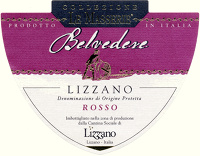
|
|
Lizzano Rosso Belvedere 2013 |
|
| Cantine Lizzano (Apulia, Italy) | |
 Malvasia Nera (85%), Negroamaro (15%) Malvasia Nera (85%), Negroamaro (15%) | |
| Price: € 6.00 | Score: |
 Intense ruby red and nuances of garnet red, moderate transparency. Intense ruby red and nuances of garnet red, moderate transparency. Intense, clean, pleasing and refined, starts with hints of plum,
blackberry and dried violet followed by aromas of black cherry, carob,
cocoa, tobacco, cinnamon and menthol. Intense, clean, pleasing and refined, starts with hints of plum,
blackberry and dried violet followed by aromas of black cherry, carob,
cocoa, tobacco, cinnamon and menthol.
 Properly tannic attack and however balanced by alcohol, good body,
intense flavors, pleasing roundness. Properly tannic attack and however balanced by alcohol, good body,
intense flavors, pleasing roundness.
 Persistent finish with flavors of plum, blackberry and black cherry. Persistent finish with flavors of plum, blackberry and black cherry. Aged in steel tanks. Aged in steel tanks. |
|
 Stuffed pasta, Roasted meat, Stewed meat with mushrooms, Cheese Stuffed pasta, Roasted meat, Stewed meat with mushrooms, Cheese |
|
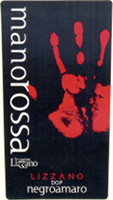
|
|
Lizzano Negroamaro Manorossa 2013 |
|
| Cantine Lizzano (Apulia, Italy) | |
 Negroamaro Negroamaro | |
| Price: € 25.00 | Score: |
 Intense ruby red and nuances of garnet red, little transparency. Intense ruby red and nuances of garnet red, little transparency. Intense, clean, pleasing and refined, starts with hints of plum,
blackberry and black cherry followed by aromas of dried violet, blueberry,
carob, raspberry, tobacco, chocolate, vanilla and menthol. Intense, clean, pleasing and refined, starts with hints of plum,
blackberry and black cherry followed by aromas of dried violet, blueberry,
carob, raspberry, tobacco, chocolate, vanilla and menthol.
 Properly tannic attack and however balanced by alcohol, good body,
intense flavors, pleasing roundness. Properly tannic attack and however balanced by alcohol, good body,
intense flavors, pleasing roundness.
 Persistent finish with flavors of blackberry, plum and black cherry. Persistent finish with flavors of blackberry, plum and black cherry. 12 months in cask. 12 months in cask. |
|
 Roasted meat, Broiled meat, Stewed meat with mushrooms, Cheese Roasted meat, Broiled meat, Stewed meat with mushrooms, Cheese |
|
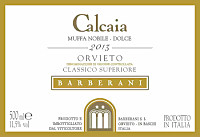
|
|
Orvieto Classico Superiore Calcaia 2013 |
|
| Barberani (Umbria, Italy) | |
 Grechetto (80%), Procanico (20%) Grechetto (80%), Procanico (20%) | |
| Price: € 50.00 - 500ml | Score: |
 Brilliant amber yellow and nuances of amber yellow, transparent. Brilliant amber yellow and nuances of amber yellow, transparent. Intense, clean, pleasing, refined and elegant, starts with hints of
raisin, dried fig and honey followed by aromas of dried apricot, quince
jam, peach jam, candied fruits, lychee, date, citrus fruit peel, saffron,
almond and nail polish. Intense, clean, pleasing, refined and elegant, starts with hints of
raisin, dried fig and honey followed by aromas of dried apricot, quince
jam, peach jam, candied fruits, lychee, date, citrus fruit peel, saffron,
almond and nail polish.
 Sweet and round attack, however balanced by alcohol, good body, intense
flavors, pleasing crispness. Sweet and round attack, however balanced by alcohol, good body, intense
flavors, pleasing crispness.
 Very persistent finish with long flavors of raisin, dried apricot and
peach jam. Very persistent finish with long flavors of raisin, dried apricot and
peach jam.
 12 months in steel tanks. 12 months in steel tanks. |
|
 Hard cheese, Dried fruit tarts Hard cheese, Dried fruit tarts |
|
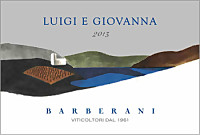
|
|
Orvieto Classico Superiore Luigi e Giovanna 2013 |
|
| Barberani (Umbria, Italy) | |
 Grechetto (90%), Trebbiano Procanico (10%) Grechetto (90%), Trebbiano Procanico (10%) | |
| Price: € 26.00 | Score: |
 Brilliant straw yellow and nuances of straw yellow, very transparent. Brilliant straw yellow and nuances of straw yellow, very transparent. Intense, clean, pleasing, refined and elegant, starts with hints of
apple, plum and hazelnut followed by aromas of medlar, pear, honey, almond,
broom, hawthorn, dried apricot, citrus fruits, mineral and hints of
vanilla. Intense, clean, pleasing, refined and elegant, starts with hints of
apple, plum and hazelnut followed by aromas of medlar, pear, honey, almond,
broom, hawthorn, dried apricot, citrus fruits, mineral and hints of
vanilla.
 Crisp attack and however balanced by alcohol, good body, intense
flavors, pleasing roundness. Crisp attack and however balanced by alcohol, good body, intense
flavors, pleasing roundness.
 Very persistent finish with long flavors of apple, plum and medlar. Very persistent finish with long flavors of apple, plum and medlar. 12 months in cask, 18 months in bottle. 12 months in cask, 18 months in bottle. |
|
 Stuffed pasta, Roasted white meat, Roasted fish, Mushroom soups Stuffed pasta, Roasted white meat, Roasted fish, Mushroom soups |
|
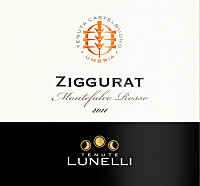
|
|
Montefalco Rosso Ziggurat 2012 |
|
| Tenuta Castelbuono (Umbria, Italy) | |
 Sangiovese (70%), Sagrantino (15%), Cabernet Sauvignon, Merlot (15%) Sangiovese (70%), Sagrantino (15%), Cabernet Sauvignon, Merlot (15%) | |
| Price: € 11.00 | Score: |
 Brilliant ruby red and nuances of garnet red, moderate transparency. Brilliant ruby red and nuances of garnet red, moderate transparency. Intense, clean, pleasing and refined, starts with hints of black
cherry, blackberry and violet followed by aromas of raspberry, black
currant, blueberry, vanilla, tobacco, cinnamon and menthol. Intense, clean, pleasing and refined, starts with hints of black
cherry, blackberry and violet followed by aromas of raspberry, black
currant, blueberry, vanilla, tobacco, cinnamon and menthol.
 Properly tannic attack and however balanced by alcohol, good body,
intense flavors, agreeable. Properly tannic attack and however balanced by alcohol, good body,
intense flavors, agreeable.
 Persistent finish with flavors of black cherry, blackberry and
raspberry. Persistent finish with flavors of black cherry, blackberry and
raspberry.
 12 months in barrique and cask, 6 months in bottle. 12 months in barrique and cask, 6 months in bottle. |
|
 Roasted meat, Broiled meat and barbecue, Stewed meat with mushrooms, Cheese Roasted meat, Broiled meat and barbecue, Stewed meat with mushrooms, Cheese |
|
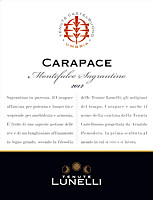
|
|
Montefalco Sagrantino Carapace 2012 |
|
| Tenuta Castelbuono (Umbria, Italy) | |
 Sagrantino Sagrantino | |
| Price: € 24.00 | Score: |
 Intense ruby red and nuances of garnet red, little transparency. Intense ruby red and nuances of garnet red, little transparency. Intense, clean, pleasing, refined and elegant, starts with hints of
black cherry, blackberry and plum followed by aromas of violet, blueberry,
chocolate, tobacco, vanilla, cinnamon, mace and menthol. Intense, clean, pleasing, refined and elegant, starts with hints of
black cherry, blackberry and plum followed by aromas of violet, blueberry,
chocolate, tobacco, vanilla, cinnamon, mace and menthol.
 Tannic attack and however balanced by alcohol, full body, intense
flavors, agreeable. Tannic attack and however balanced by alcohol, full body, intense
flavors, agreeable.
 Persistent finish with flavors of plum, blackberry and black cherry. Persistent finish with flavors of plum, blackberry and black cherry. 24 months in cask, 12 months in bottle. 24 months in cask, 12 months in bottle. |
|
 Game, Roasted meat, Braised and stewed meat, Hard cheese Game, Roasted meat, Braised and stewed meat, Hard cheese |
|
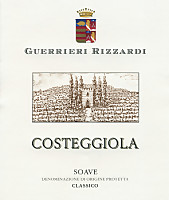
|
|
Soave Classico Costeggiola 2015 |
|
| Guerrieri Rizzardi (Veneto, Italy) | |
 Garganega (70%), Chardonnay (30%) Garganega (70%), Chardonnay (30%) | |
| Price: € 9.00 | Score: |
 Brilliant straw yellow and nuances of straw yellow, very transparent. Brilliant straw yellow and nuances of straw yellow, very transparent. Intense, clean and pleasing, starts with hints of apple, plum and
hawthorn followed by aromas of pear, citrus fruits, pineapple and almond. Intense, clean and pleasing, starts with hints of apple, plum and
hawthorn followed by aromas of pear, citrus fruits, pineapple and almond.
 Crisp attack and however balanced by alcohol, good body, intense
flavors. Crisp attack and however balanced by alcohol, good body, intense
flavors.
 Persistent finish with flavors of apple, plum and almond. Persistent finish with flavors of apple, plum and almond. Aged in steel and cement tanks. Aged in steel and cement tanks. |
|
 Crustacean appetizers, Fried fish, Pasta with fish and crustaceans, Sauteed fish Crustacean appetizers, Fried fish, Pasta with fish and crustaceans, Sauteed fish |
|
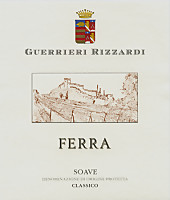
|
|
Soave Classico Ferra 2014 |
|
| Guerrieri Rizzardi (Veneto, Italy) | |
 Garganega Garganega | |
| Price: € 11.90 | Score: |
 Brilliant golden yellow and nuances of golden yellow, very transparent. Brilliant golden yellow and nuances of golden yellow, very transparent. Intense, clean, pleasing and refined, starts with hints of plum, apple
and hawthorn followed by aromas of citrus fruit peel, medlar, honey, pear,
vanilla and almond. Intense, clean, pleasing and refined, starts with hints of plum, apple
and hawthorn followed by aromas of citrus fruit peel, medlar, honey, pear,
vanilla and almond.
 Crisp attack and however balanced by alcohol, good body, intense
flavors, pleasing roundness. Crisp attack and however balanced by alcohol, good body, intense
flavors, pleasing roundness.
 Persistent finish with flavors of plum, apple and medlar. Persistent finish with flavors of plum, apple and medlar. 12 months in cask. 12 months in cask. |
|
 Stuffed pasta, Roasted fish, Mushroom and legume soups, Stewed fish, Roasted white meat Stuffed pasta, Roasted fish, Mushroom and legume soups, Stewed fish, Roasted white meat |
|
|
||||||||
|
DiWineTaste Polls
|
| |||||||
Privacy Policy | |||||||


| Copyright © 2002-2024 Antonello Biancalana, DiWineTaste - All rights reserved |
| All rights reserved under international copyright conventions. No part of this publication and of this WEB site may be
reproduced or utilized in any form or by any means, electronic or mechanical, without permission in writing from DiWineTaste. |